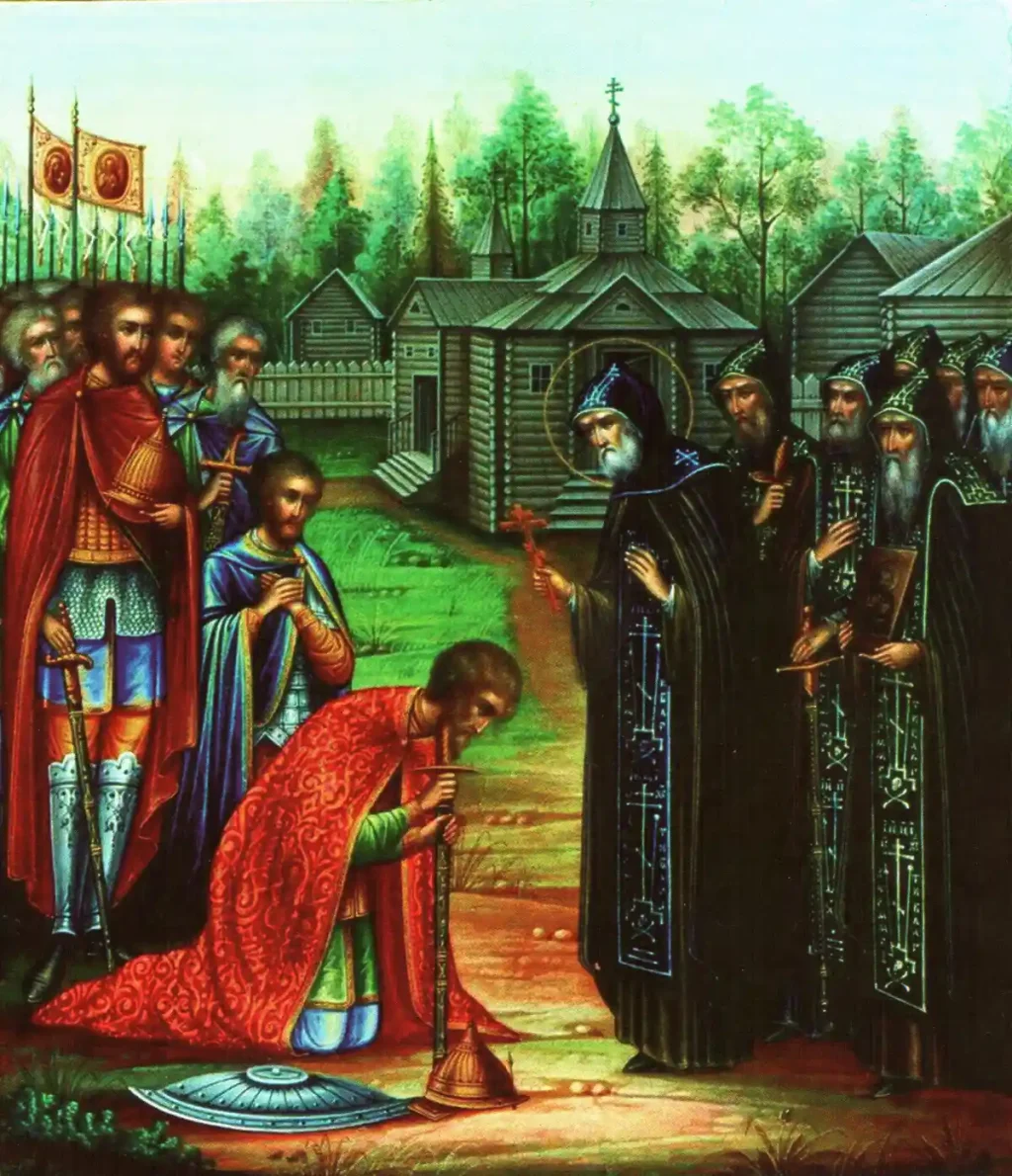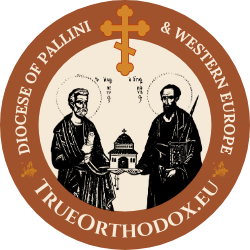How to Address Orthodox Clergy and Monastics

“It is well to reverence both God and the bishop. He who honours the bishop has been honoured by God.”
(St. Ignatius of Antioch, Letter to the Smyrnaeans, Ch. 9)
“For the priestly office is indeed discharged on earth, but it ranks amongst heavenly ordinances; and very naturally so: for neither man, nor angel, nor archangel, nor any other created power, but the Paraclete Himself, instituted this vocation, and persuaded men while still abiding in the flesh to represent the ministry of angels… For if anyone will consider how great a thing it is for one, being a man, and compassed with flesh and blood, to be enabled to draw near to that blessed and pure nature, he will then clearly see what great honor the grace of the Spirit has vouchsafed to priests.”
(St. John Chrysostom, On the Priesthood, Bk. 3)
“[Archbishop] Martin … came to the royal banquet. …there were guests present who had been invited as if to a festival; men of the highest and most illustrious rank… About the middle of the banquet, according to custom, one of the servants presented a goblet to the king. [The king] orders it rather to be given to the very holy bishop, expecting and hoping that he should then receive the cup from his right hand. But Martin, when he had drunk, handed the goblet to his own presbyter, as thinking no one worthier to drink next to himself, and holding that it would not be right for him to prefer either the king himself, or those who were next the king, to the presbyter.”
(The Life of St. Martin of Tours)
“Reverence the deacons, as being the institution of God.”
(St. Ignatius of Antioch, Letter to the Smyrnaeans, Ch. 8)
Mobile phones and messaging apps have made clergy and monastics more accessible than ever, but this accessibility can lull one into a sense of overfamiliarity. When a layperson contacts a bishop, a priest, or a monastic, they are not calling a friend from work or the local club. Rather, they are approaching a man chosen by God to hold a sacred office in the Church, or one who has dedicated their entire life to God.
This article is a reminder of the proper and traditional way that Orthodox Christians should act towards clergymen and monastics.
The Basic Rule: The Higher Blesses the Lower
The Holy Apostle Paul says: “And without all contradiction the less is blessed of the better” (Hebrews 7:7).
A priest or a bishop has the grace of ordination. They are set apart to bestow God’s blessing. A layperson receives a clergyman’s blessing, and doesn’t give it. When a bishop or a priest gives a blessing, it is Christ Himself Who gives the blessing through that clergyman. A layperson should never say “God bless you” to a clergyman or monastic. Instead, one must ask for the clergyman’s blessing, or for the monastic’s prayers.
Greeting Clergy in Person
When a layperson meets a priest or bishop, they should not greet them with a casual “Hello.”
- To a priest or hieromonk, one should say: “Father, bless.”
- To a bishop, one should say: “Master, bless.” (Or use the Greek word for “Master”; “Despota,” or the Slavonic word, “Vladyka”).
As the clergyman makes the sign of the Cross over them, the layperson makes a small bow from the waist (a half-prostration), touching the floor with their right hand if able. Then, they should cup their hands with the right hand over the left and raise them to the clergyman.
The clergyman will place his hand in theirs. The layperson should then kiss his hand. This is not an act of worship toward the man; rather, they are kissing the hand of Christ Himself, Who has just blessed them.
A layperson should also ask for a blessing in the exact same way when saying goodbye to a clergyman.
When interacting with simple monks and nuns (those not ordained), it is proper to ask for their prayers.
Titles and Forms of Address
The clergyman’s or monastic’s first name is always used when addressing them, not their surname.
Bishops and Higher Ranks
Bishop:
- Formal Title: “His Grace, Bishop [First Name]”
- Direct Address: “Your Grace,” or the traditional “Master” (Despota / Vladyka).
Archbishop/Metropolitan:
- Formal Title: “His Eminence, Archbishop/Metropolitan [First Name]”
- Direct Address: “Your Eminence,” or “Master” (Despota / Vladyka).
Priests
- Formal Title: “The Reverend Father [First Name]” or “The Very Reverend Father” (for an Archpriest).
- Informal Address: “Father [First Name]”
Deacons
- Formal Title: “The Reverend Deacon [First Name]”
- Informal Address: “Father [First Name]” or “Deacon [First Name]”
Monastics (Monks and Nuns)
Monks:
- Formal Title for Abbots and Hieromonks: “The Reverend Father [First Name]”
- A Hieromonk (a monk who is a priest) is addressed as a priest (“Father [First Name]”).
- Simple monks are also addressed as “Father [First Name]”.
Nuns:
- Formal Title for an Abbess: “The Reverend Mother [First Name]”
- A tonsured nun is addressed as “Mother [First Name]”.
- A novice is addressed as “Sister [First Name]”.
Phones, Texts, and Emails
The rules of etiquette are the same for phone calls, text messages, or emails.
Phone Calls:
A layperson should not begin a call with “Hey, Father” or similar. The conversation should be started by asking for a blessing, for example:
“Father, bless. This is [Christian Name].”
Written Correspondence (Letters, Emails, Texts):
Even brief messages to a priest should follow Church tradition.
- Opening: One should always begin by asking for a blessing.
- “Bless, Father,”
- “Bless, Master,” (for a bishop).
- “Dear Father [Name], I ask for your blessing.”
- Closing: It is proper to conclude by asking for their prayers, or by noetically kissing their right hand as a replacement of the physical kiss that you would usually make in person:
- “Asking for your prayers,”
- “Kissing your right hand.”
A practical note: if a person is exchanging multiple emails or messages with a clergyman in a single, back-and-forth conversation, there is no need to ask for a blessing in each reply. A good rule of thumb is to ask for a blessing in your first message to a clergyman on any particular day.
These are necessary and ancient practices of our Faith which instill humility in the laity and reinforce the sacred, God-given order of the Church’s ranks. This duty to show reverence is directed above all toward the priesthood, whose office is so awesome that it commands a respect greater than that given to kings or even angels. As Saint Kosmas of Aetolia teaches:
“You laymen should honor your priests. And if you chance to come upon a priest and a king, you should give preference to the priest. If you chance upon a priest and an angel, prefer the priest, because the priest is higher than even the angels… It is my duty when I meet a priest to bow and kiss his hand and to ask him to beseech God for my sins. The entire world can beseech God, but cannot perform the Holy Mysteries. But a priest, even a sinner, with the grace of the Holy Spirit, can perform the Holy Mysteries.”
(St. Kosmas of Aetolia)







1 thought on “How to Address Orthodox Clergy and Monastics”